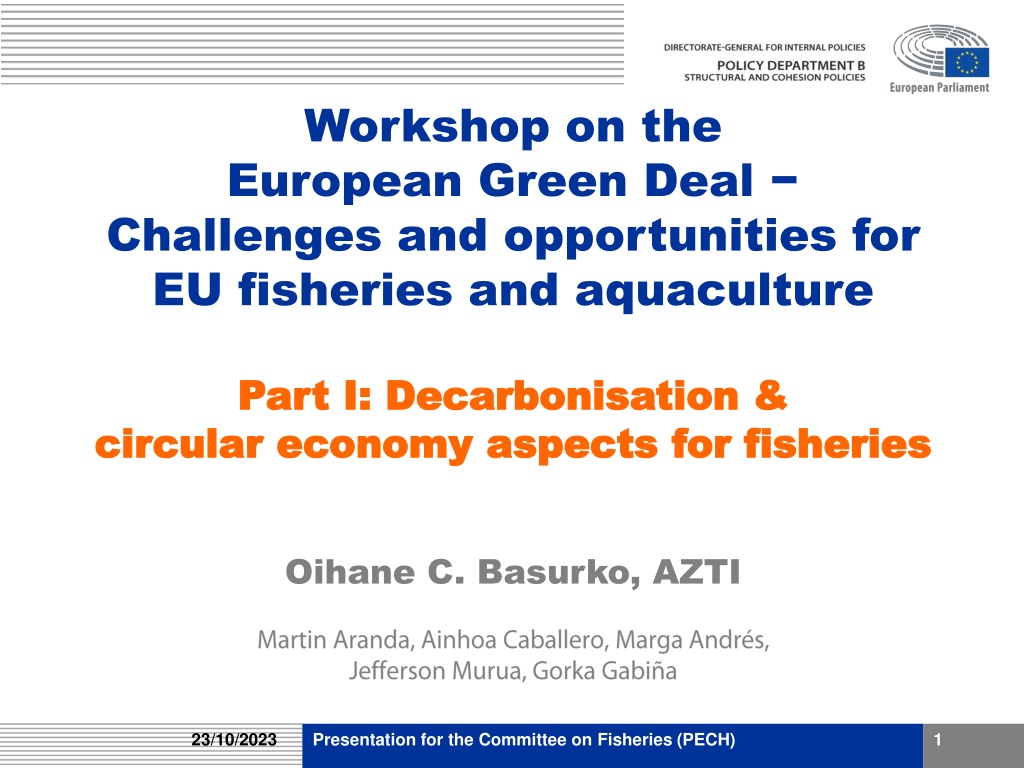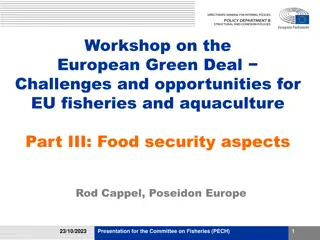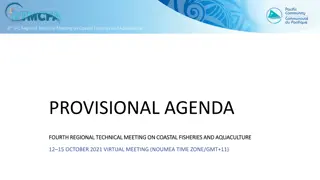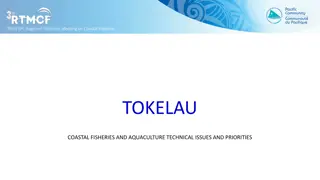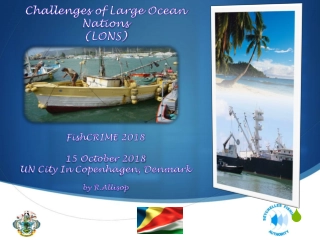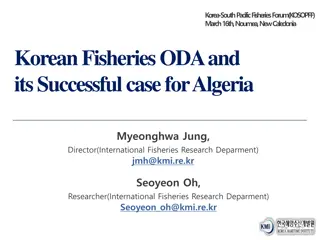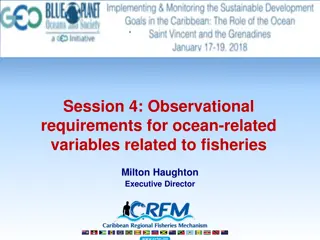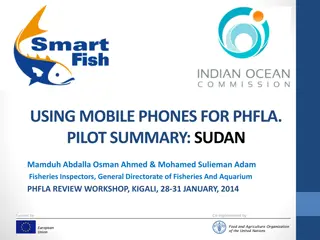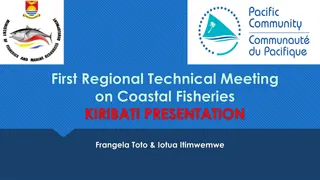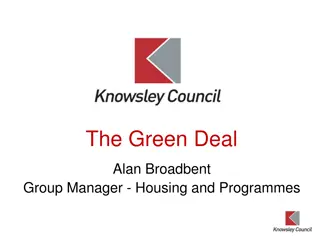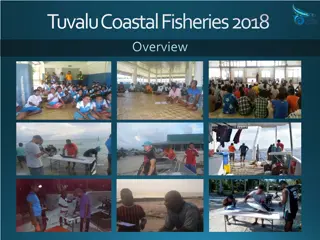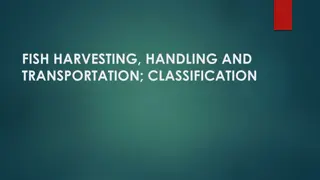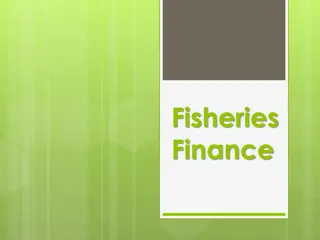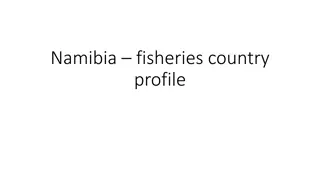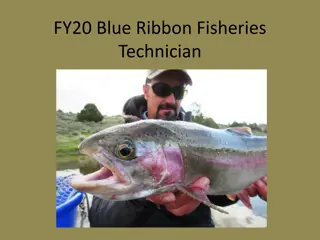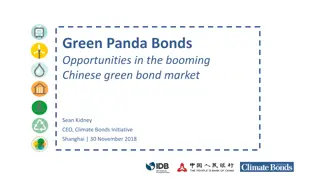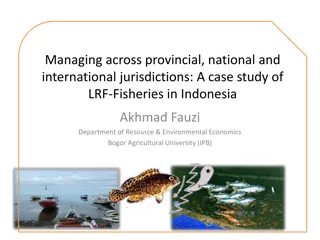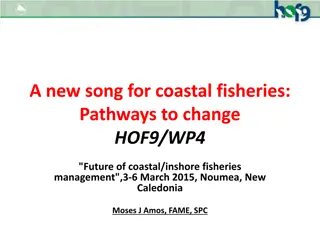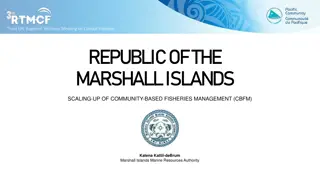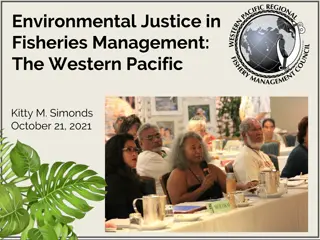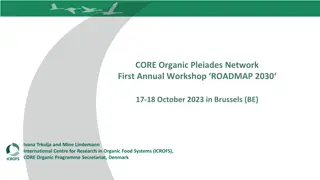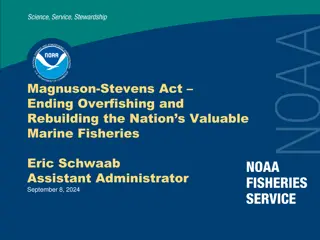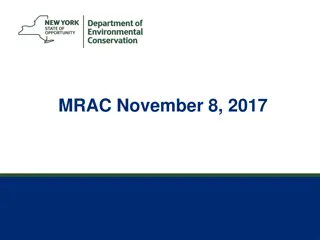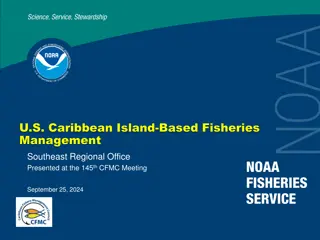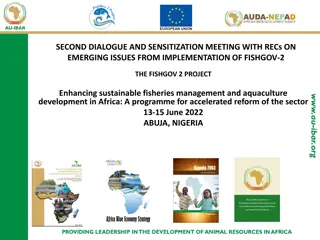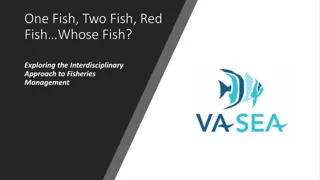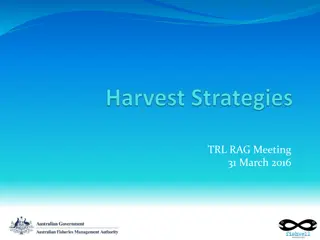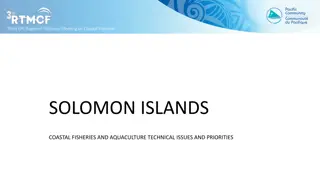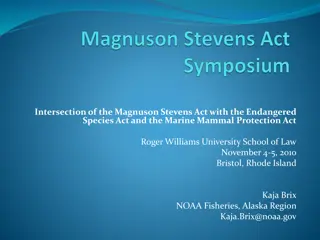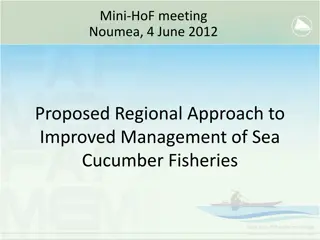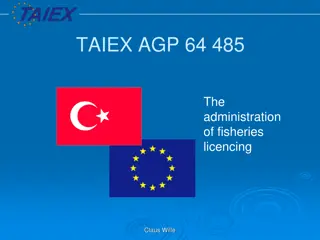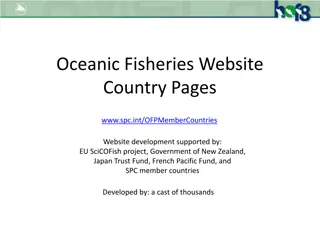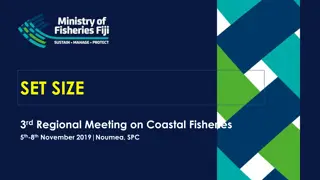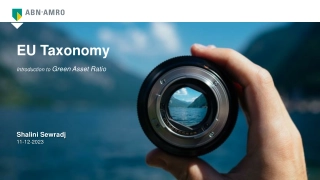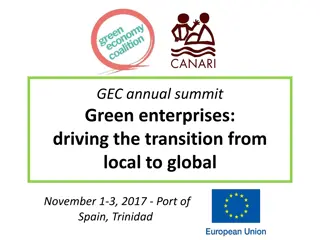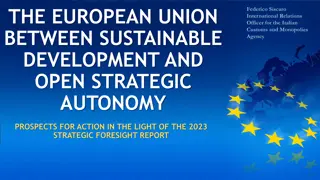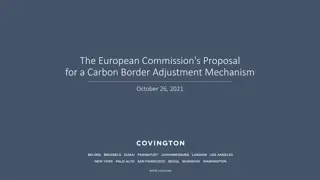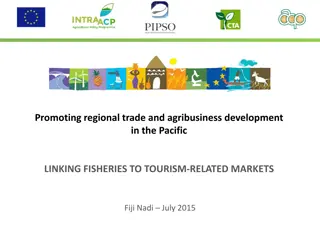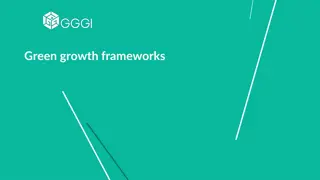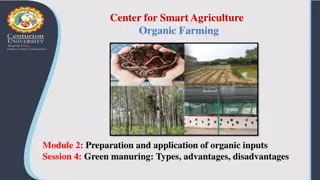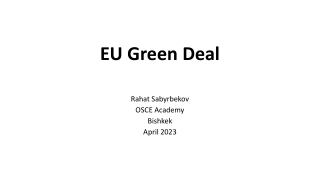Challenges and Opportunities for EU Fisheries in the European Green Deal Workshop
Workshop on the European Green Deal discusses challenges and opportunities for EU fisheries related to decarbonisation and circular economy aspects. Policy initiatives, decarbonisation solutions, and barriers to implementation are highlighted, along with concrete policy recommendations for EU decision-makers.
Download Presentation

Please find below an Image/Link to download the presentation.
The content on the website is provided AS IS for your information and personal use only. It may not be sold, licensed, or shared on other websites without obtaining consent from the author. Download presentation by click this link. If you encounter any issues during the download, it is possible that the publisher has removed the file from their server.
E N D
Presentation Transcript
Workshop on the European Green Deal Challenges and opportunities for EU fisheries and aquaculture Part Part I: Decarbonisation & I: Decarbonisation & circular circular economy aspects for fisheries economy aspects for fisheries Oihane C. Basurko, AZTI 23/10/2023 Presentation for the Committee on Fisheries (PECH) 1
Objectives of the study Objectives of the study Define the challenges and opportunities for EU fisheries in relation to Low carbon & circular economy aspects of the European Green Deal. Provide concrete policy recommendations relevant to EU decision-making. 23/10/2023 Presentation for the Committee on Fisheries (PECH) 2
1. 1. Policy initiatives of the EGD Policy initiatives of the EGD Climate Ambition Energy efficient INVESTMENT Climate ambition & secure energy Renewable & Low carbon ENERGY SOURCES (incl. Infrastructure) this contract Farm to Fork CFP, EU 2020 Strategy Sustainable & Smart mobility: Fit for 55 MARPOL 73/78 European Green Deal Decarbonisation & circular economy in EU fisheries Climate ambition Implementation of Energy efficient SOLUTIONS this contract Clean & circular economy EPR, PRF, SUP Clean, affordable and secure energy Increase ENERGY EFFICIENCY Resource efficiency roadmap (Europe 2020 Strategy) Financial support: EMFAF, LAGs, others 23/10/2023 Presentation for the Committee on Fisheries (PECH) 3
2. 2. Decarbonisation aspects for Decarbonisation aspects for EU s fishing EU s fishing fleet fleet Current situation: Solutions are available, funding ready and regulations in place but implementation of solutions is very low at EU level due to several barriers. The fuel price has increased from 0.2 /L to 1.20 /L (2002-2022). Definition: Energy efficient: Fuel consumption exploiting fishing stocks in an energy efficient manner: ???????????? (?) ???? (?) indicator FUI (fuel use intensity) Low carbon: GHG emissions Using alternative energy (fuels, electricity) that emits less GHG emissions Alternative refrigerants. 23/10/2023 Presentation for the Committee on Fisheries (PECH) 4
2.1 Decarbonisation 2.1 Decarbonisation solutions that can be applied in solutions that can be applied in fisheries fisheries The EU fishing fleet is very diverse, there are no one-fits-all solutions. 23/10/2023 Presentation for the Committee on Fisheries (PECH) 5
2.2 Challenges of implementing low carbon solutions Economic barriers Funds are mainly for small-scale under certain criteria Funds available but do not compensate the risk taken by fishers Market not ready for energy efficient solutions Human barriers Low proactivity and reluctancy to new innovations Skippers and shipowners have different objectives Regulatory barriers National and European regulations may go at the same speed Some solutions may increase of GT and kW, but not necessarily the ability to catch fish Only small-scale fisheries eligible for funding (in EMFAF) Funding request may imply high administrative burden Technological barriers There is no one-fits-all solution Port infrastructure may not be ready Information barriers Wrong message is communicated Low knowledge transfer and poor communication amongst stakeholders 23/10/2023 Presentation for the Committee on Fisheries (PECH) 6
2.3 Lessons learned Decarbonisation of fishing fleets will help the sector to have a more profitable activity and less energy-dependant. Monitoring of energy consumption and operational profiles of vessels is key: One-fits-all solutions do not exist Energy activity and activity pattern are key Energy monitoring devices are needed Reporting to the Commission can be improved Fishers need to be incentivised or motivated to adopt solutions Skippers and shipowners have different objectives Better communication is needed amongst stakeholders Consumers can act as change-drivers Energy efficiency as part of sustainable products from fisheries Energy transition requires funding Funds should be more flexible and inclusive 23/10/2023 Presentation for the Committee on Fisheries (PECH) 7
2.4 POLICY 2.4 POLICY RECOMMENDATIONS RECOMMENDATIONS Decarbonisation of EU s fishing fleet Define a fisheries roadmap towards decarbonisation. Revise EU s definition of the term fishing capacity, because adding more GTs or kW does not necessarily increase a vessel s ability to fish, and is a sine qua non condition for applying some of the energy efficiency solutions. Promote the implementation of a mixture of energy efficient solutions due to there is no one-fits-all solution applicable to all fishing vessels and fishing modalities. Promote the installation of energy monitoring devices in all fishing fleet segments. Make the European Data Collection Frameworkinclude detailed data on energy consumption of fisheries reported by energy monitoring devices. Embrace a simpler and more flexible process for funding applicationfor investment or installation of energy efficient solutions. Encourage the inclusion of fishing vessels of different sizes in the energy efficiency policy framework of the IMO (MARPOL 73/78). Establish a European cooperation platform to address energy efficiency in fisheries, exchange successful stories, promote dialogue and cooperation, and facilitate the transference of information and sustainability awareness. Promote the development of seafood labels/eco-certifications incorporating the carbon footprint or Fuel Use Intensity (FUI) score of the fishery on food products. 23/10/2023 Presentation for the Committee on Fisheries (PECH) 8
3. 3. Circular economy Circular economy aspects in aspects in EU fisheries EU fisheries Definition: Circular economy aims at maintaining the value of products, materials, and resources for as long as possible by returning them into the product cycle, while minimizing the generation of waste, so the life cycle of products is extended . Current situation: Circular economy has the ability to create employment, business opportunities, and alternative income for coastal communities. Society is showing a change in consumption patterns towards products made of marine plastic (new market niches, production models) and other services. Few examples are available, mainly for larger vessels, few for small-scale fisheries. Circular economy in the fisheries sector have been focused on solutions for: smart design of fishing gear (still at an early stage) collection of marine litter at sea (implementedbyregion) marine litter, End of Life fishing gear and fish waste collection, recycling and upcycling (most popular activity) 23/10/2023 Presentation for the Committee on Fisheries (PECH) 9
3.1 Circular 3.1 Circular economy solutions applicable in economy solutions applicable in fisheries fisheries EOL: end of life ALDFG: abandoned lost or otherwise discarded fishing gear 23/10/2023 Presentation for the Committee on Fisheries (PECH) 10
3.2 Challenges of implementing circular economy solutions Circular design of gears: New generation of materials can become a hassle at their end of life (EOL) Low implementation onboard (more expensive, conflicting views on new designs) Collection of marine litter by fishers: Marine litter accumulation areas are often unknown Lack of storage onboard Landing of marine litter can be difficult (no adequate facilities or collaboration and responsibility by waste managers) Additional port waste fee Lack of awareness and training Recycling of fishing gear: Fishing gear are made of a mix of materials Waste is dirty and mixed Few local recyclers and knowledge on how to recycled marine litter and end of life (EOL) fishing gear Quantities of stored waste may be too low to guarantee a successful business Lack of traceability of products made by ocean plastic EPR scheme: differences between large vs small fishing gear producers 23/10/2023 Presentation for the Committee on Fisheries (PECH) 11
3.3. Lessons learned Fishing sector has experience on embracing circular practices, which is still limited: Positive experience in marine litter collection and recycling/upcycling of EOL fishing gear, new business partnerships, new products and interest from fashion industry. The initiatives have created new jobs, but the challenge is to guarantee the continuation of these activities in the long-term. Ports are key: Port reception facilities for marine litter and EOL fishing gear should be widespread in all ports, regardless the size and who is responsible for the management. Marine litter and EOL fishing gear should be handled (stored, conditioned, recycled) by local companies. The few amount of EOL fishing gear collected may jeopirdise the business feasibility. Awareness raising and more control is required: Transparency is key to avoid green claims of new circular products. Practices at sea and in port, as well as consumption patterns and practices should be changed. 23/10/2023 Presentation for the Committee on Fisheries (PECH) 12
3.4 POLICY RECOMMENDATIONS Circular economy in fisheries (1) Fisheries roadmap: Define a fisheries roadmap to develop the circular economy in fisheries value chain. Circular gears: Outline an agreed definition for circular fishing gear including targets for recycled content and associated legislation. Establish a standardised approach to mark and label the polymers and materials composing the fishing gear to facilitate its final recycling. Harmonised management of EOL fishing gear and marine litter: Define a standardised collection, sorting, conditioning and recycling scheme for EOL fishing gear and marine litter as well as a unified reporting system at European level . Financially support programmes that promote the expansion of fishing for litter (FFL) schemes across Europe. Establish an EPR scheme for fishing gear with financial schemes and support, and with defined responsibilities. Establish mechanisms to improve the logistics associated with the full value chain for the recycling of marine litter and EOL fishing gear across Europe. Improve the collaboration, cooperation, and dialogue amongst stakeholders and between / within regions to establish responsibilities on waste management. 23/10/2023 Presentation for the Committee on Fisheries (PECH) 13
3.4 POLICY RECOMMENDATIONS Circular economy in fisheries (2) R&D&I: Promote and finance research and innovation on circular economy in fisheries by supporting pilot projects, and synergies between stakeholders. Market and business development: Incentivise the development of local circular solutions and projects embracing the cooperation and partnerships between actors of the fishing industry s value chain, FLAGs, local waste managers, recycling companies and other entrepreneurs. Promote the market for circular fishing gear and recycled marine litter by, for example, fostering the green procurement of marine plastic-derived products. Promote the traceability of products made of marine plastic or other fishery-related wastes by, for example, establishing a label to define plastic of marine origin (link to digital product passport). Awareness raising and development of skills: Increase awareness raising and training skills activities for reducing the marine litter contribution from fisheries and increase the participation in circular solution practices. 23/10/2023 Presentation for the Committee on Fisheries (PECH) 14
Many thanks! Contact: Oihane C. Basurko ocabezas@azti.es X : @oihanecb https://www.azti.es/ 23/10/2023 Presentation for the Committee on Fisheries (PECH) 15
